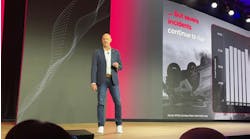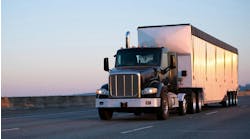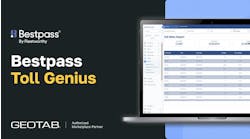Don Osterberg, vp of safety and driver training for Schneider National, Inc. and Jim Booth, fuel economy consultant and owner & president of Fifth Wheels Plus, were the featured speakers for the second webcast in the free “Survivor’s Guide to the Fuel Crisis” series presented by Truckload Carriers Association and FleetOwner. The two recognized industry experts each focused on the impact driver behavior can have on reducing fuel costs and offered concrete suggestions for how to implement programs that make fuel economy a priority for drivers.
During the interactive session on August 5, Osterberg shared the results of Schneider’s own fuel economy program, including the company’s use of simulators for driver training, and offered tips for fleets of any size:
- Monitor tire air pressure at every pre-trip inspection
- Turn off compression brakes (except in the mountains)
- Keep engine warm-up to a minimum
- Use cruise control when it is safe to do so
- Avoid unnecessary starts and stops
- Make fuel-efficient driving a “want-to” versus a “have-to” for drivers with incentives
Osterberg also stressed the correlation between fuel-efficient driving and safe driving. “If you are wondering why the safety person is talking about MPG (miles per gallon), based upon our analysis, our best drivers for MPG are also our safest drivers,” he noted, citing the numbers to prove it. In a study, Schneider’s top 100 drivers in terms of MPG had a 37% lower accident rate than the 100 drivers with the lowest MPG. The top 500 MPG drivers had a 23% lower accident rate and the top 1,000 MPG drivers had a 21% lower accident rate than the lowest 1,000 MPG drivers.
Speaker Jim Booth, considered by many in the trucking industry as the fuel economy test expert for his years of work directing fuel economy test runs for Caterpillar and for truck OEMs, also offered plenty of real-world examples of the impact driver performance can have on fuel economy. Among Booth’s driving tips:
- Coast in gear
- Use progressive shifting to keep the engine rpm low where it uses less fuel to do the same work
- Keep idling to a minimum
- Stay in high gear as long as possible
- Slow down
The speakers also dispelled some popular myths about driving for fuel efficiency during the lively question and answer session following their prepared remarks. Booth, for example, stressed the fact that slowing down does not add as much extra time to a typical trip as many drivers think it will. “Slowing down from 65 mph to 62 mph is just not going to add significantly to your trip time,” he said.
Booth also noted that fleet owners and managers as well as their drivers might have to change old habits if they want to start saving fuel. “I would go broke if I tried to run my operation the way I did in the past,” he said. “You have to be ready to change if you want to survive.”
If you missed the opportunity to see this Webcast live, you can still view the archived version. Registration is required, but there is no charge.
The final Webcast in this series, “Vehicle Specifying and Maintenance Strategies for Maximizing Fuel Efficiency,” will feature Bruce Stockton, vp of maintenance and asset management for Con-way Truckload and Darry Stuart, president & CEO of DWS Fleet Management and general chairman of TMC for 2007-2008. It will be on September 23rd at 2:00 p.m. EDT.


